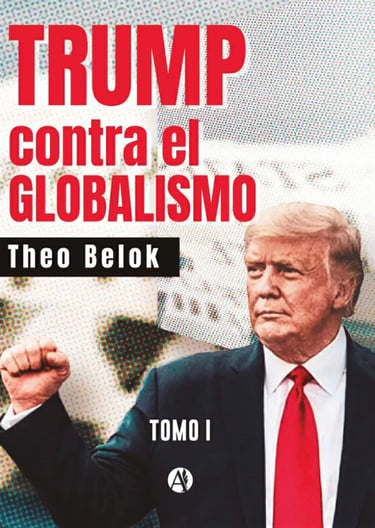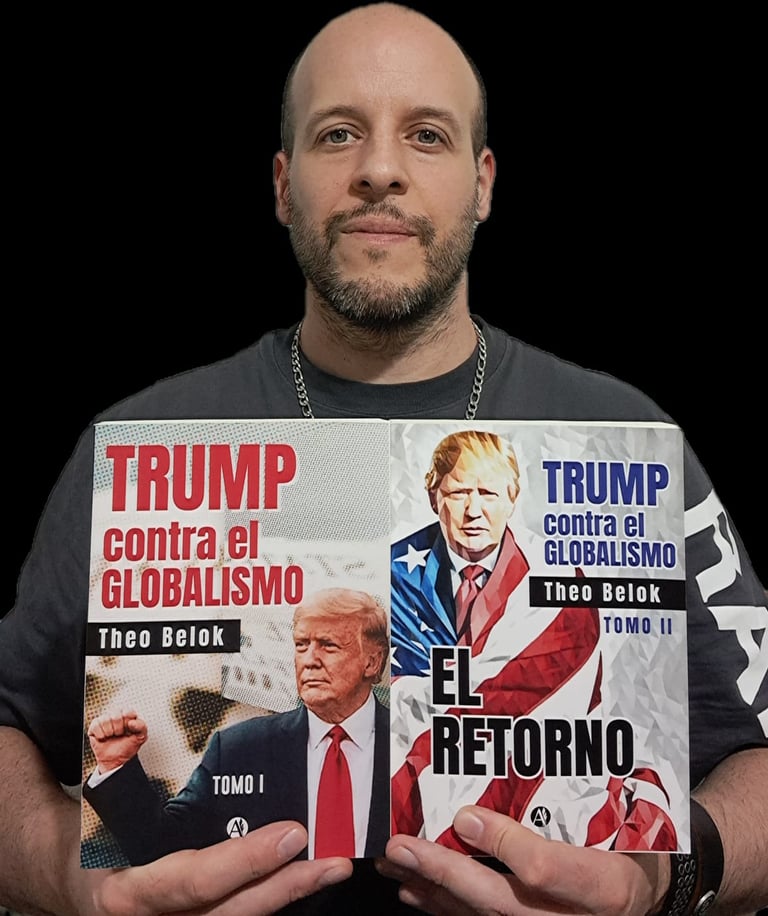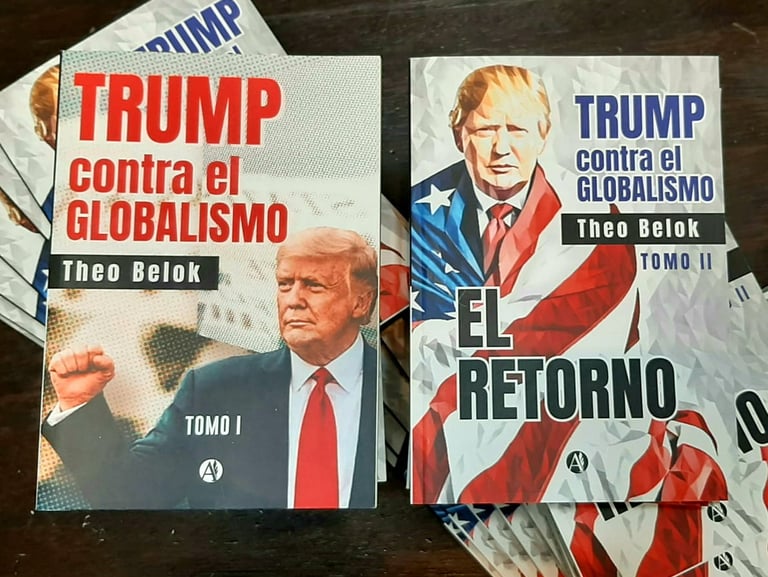TRUMP AGAINST GLOBALISM.
THE RETURN.
Volume 2.
Theo Belok
In this work, published in July 2024, the secret strategy that led Donald Trump to political success in the United States is revealed. I develop original definitions of the three branches of globalism and present concepts from a patriotic-sovereignist perspective. I also analyze the influence of the Culture Wars and Trump's alliances and enmities with different movements and power groups. I highlight the financiers and the most important themes of the 2016, 2020, and current 2024 presidential campaigns. I address the trade war with China and the attempted coup d'état following the Russiagate scandal.
This independent approach makes it possible to move away from the often simplistic Cartesian linear interpretation, in order to better understand the complex dialectical strategies and tactics that the magnate, turned politician, carried out during his administration.
Reading Volume II is not dependent on Volume I, as it can be read independently, although the former is recommended, as it delves deeply into the phenomenon of globalism. Through this investigation, it is hoped that the reader will broaden their awareness and strengthen their own freedom. Trump is preparing for revenge. The seeds for the liberation of nations have been planted. The future belongs to the patriots, and of course, the best is yet to come.
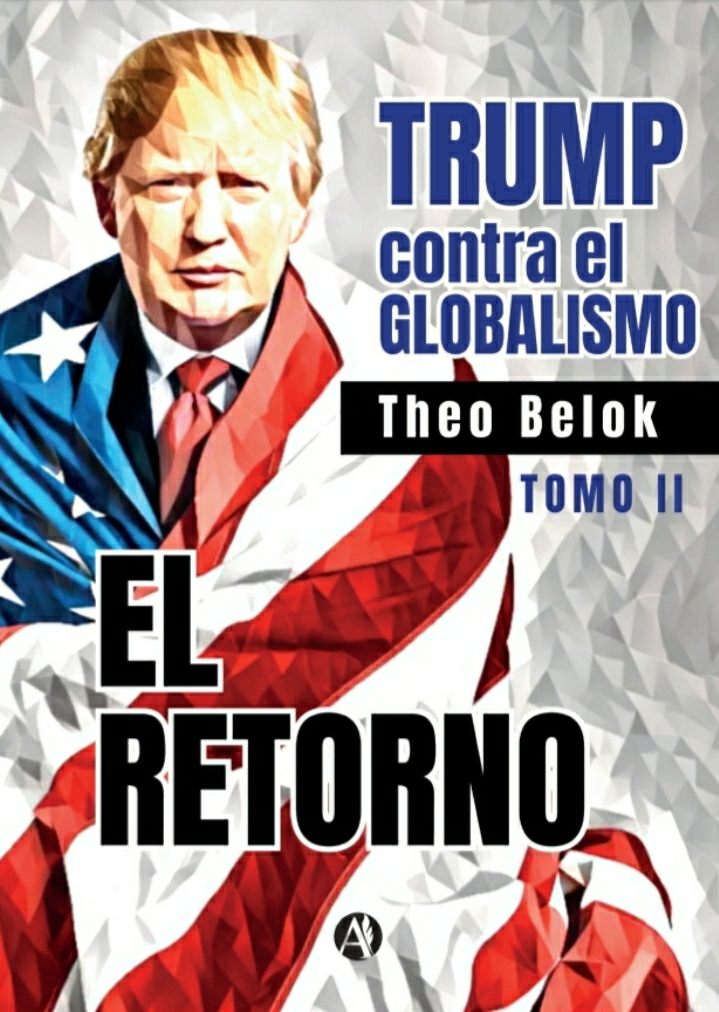


Explanatory videos
Presentaciones


In August 2024, Theo Belok presents the book and is interviewed by prestigious analyst and best-selling author Colonel Pedro Baños in front of 70,000 people.
Interviewed by Erick Kamerath of the PoliticAlt channel
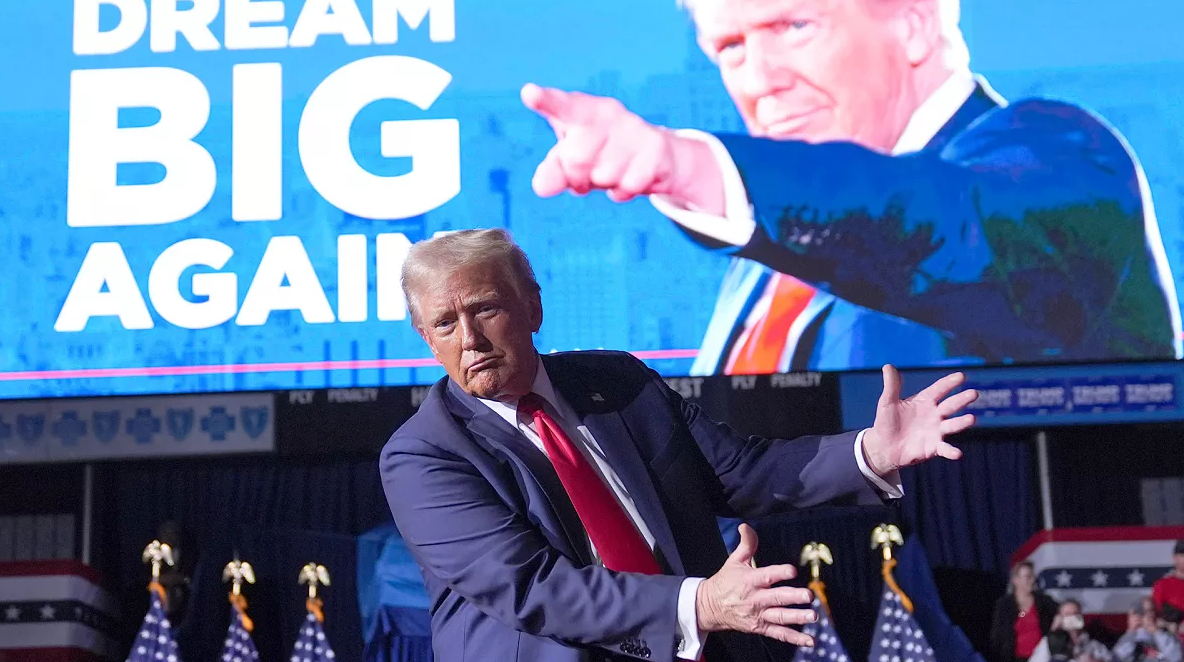

CHAPTER 1 - THE RISE OF DONALD TRUMP
1.1 The 5 keys to its success
1.2 The old right and the new right
1.3 Political, economic and cultural globalism
1.4 Its fundamental ideas
1.5 The big hoax: Trump, the Davos puppet
CHAPTER 2 - OTHER VARIABLES FOR ANALYSIS
2.1 Trump vs Wall Street
2.1.1 Trump deceived the Wall Street titans
2.1.2 The Markets sabotage Trump
2.1.3 The Koch network torpedoes Trump
2.2 First Cabinet
2.3 The press - The true opposition party
2.4 Traitorous Republicans vote Democrat
2.5 The alternative right supports Trump
2.6 Alt right: from underground to mainstream
2.7 Genesis of a controversial movement
2.8 Bannon and Yiannopoulos, villains exposed
2.9 Bannon and his discreet conservative patron
2.10 Trump supports the alternative right
2.11 Trump is not a Freemason
2.12 Trump's conspiracy theories
2.12.1 The Deep State
2.12.2 "Qanon"
2.12.3 How Trump neutralized Epstein
2.13 Trump kicks the board to the Club Bilderberg
2.14 The Purge of the Nationalist Court
2.15 Trump Defends the Dollar Against Alternative Currencies
2.16 Russian Hackers, Rusiagate, Spygate, Ukraniagate, Impeachment
2.17 China vs. the US – The Thucydides Trap
2.18 Discordant Notes: 9/11, the Fed, and Vaccines
CHAPTER 3 - ELECTIONS 2020-2024
3.1 Claims of an announced fraud
3.2 Media terrorism
3.3 Mass media. 4 years sabotaging democracy
3.4 George Floyd and the “BLM” terror
3.5 “Vote dominance” and the dead who vote
3.6 Campaign themes 2016-2020-2024
3.7 Who was the most funded candidate in 2020?
3.8 Who funded Trump and Biden in 2020
3.9 The Pentagon purge
3.10 Wall Street props up Biden
3.11 The arms industry elects Biden
3.12 Explosive laptop and Big Tech censorship
Academic Abstract (English Version)
This study analyzes the political positioning of Donald J. Trump in relation to the phenomenon of globalism, based on a central hypothesis: to determine whether he represents a genuine opposition to the dominant global order or functions as a figure serving its interests. Through a qualitative, interpretative, and critical methodology, the research addresses the conceptual construction of globalism, the examination of global power structures, and the historical and strategic relationship between those structures and the political actor under analysis.
Employing structural, genealogical, and discursive analysis, the study explores the possibility that Trump operated as a form of controlled opposition, as well as the degree of coherence between his rhetorical promises and the policies he ultimately implemented. The work also includes a psycho-political profile of the figure, based on his personal history, public statements, and past behavior, aiming to identify consistent behavioral patterns.
The investigation is not aligned with traditional ideological frameworks such as Marxism, postmodernism, or critical theory, although it does utilize analytical tools that overlap with those schools in their focus on power dynamics, political narratives, and mechanisms of legitimacy. The methodological approach was developed independently, from an alternative and autonomous worldview, granting the study a unique character in both its formulation and conclusions.
STUDY METHODOLOGY
This research was constructed from a qualitative, interpretive, and critical approach, aimed at analyzing Donald J. Trump's political and ideological positioning in relation to the phenomenon of globalism. Although the research process was largely intuitive, the approach followed is based on methodological frameworks widely recognized in the social sciences.
First, the research was structured around a central hypothesis: to determine whether the political actor analyzed embodies a truly anti-globalist stance or, on the contrary, whether his narrative reflects a covert form of continuity with the interests of the dominant global order. This starting point frames the work within the hypothetico-deductive method, establishing a guiding question that is contrasted with various empirical and conceptual sources.
At the epistemological level, the approach adopted is aligned with a hermeneutic and constructivist perspective, as it proceeded to a conceptual elaboration of the term "globalism," not from canonical definitions, but rather from its social, media, and political construction. This involved an analysis of contemporary common sense, as well as a theoretical elaboration of the concept, its implications, and its actors.
The analytical core focused on the study of global power structures, genealogies of political and economic influence, and their connection to the rise and administration of Donald Trump. This dimension of the work was inspired by Foucauldian genealogy, which allows us to trace the origin and evolution of certain configurations of power, and also by structural analysis, which examines the relationships between actors and institutions beyond individual intentions.
Likewise, a critical perspective was integrated, particularly when addressing the concept of controlled dissent, as a tool to investigate whether Trump represented a genuine break with the system or whether his figure served a renewed form of hegemony. This approach aligns with the frameworks of critical theory and neo-Gramscian currents, which analyze how power is reconfigured and co-opts forms of opposition.
In parallel, a political psychoprofile of the figure in question was developed, articulating biographical, discursive, and behavioral elements to understand the motivations and behavioral patterns that underpin his political actions. This qualitative approach is based on techniques from discourse analysis and biographical-interpretative analysis.
Finally, a systematic comparison was carried out between campaign promises, expressed ideological positions, and implemented policies to assess the degree of coherence or disparity between discourse and action. This stage involved triangulating sources—speeches, official data, and historical analyses—which strengthens the validity of the analysis.
Overall, the methodology adopted does not reflect a single school or current, but rather represents a hybrid methodological strategy that combines tools from political analysis, the sociology of power, political philosophy, and critical theory, with the aim of offering a thorough and rigorous interpretation of a highly complex contemporary political phenomenon.
It should be noted that the methodological approach presented here was developed independently, without prior adherence to any particular ideological school. The use of analytical tools that may coincide with authors such as Foucault or Gramsci does not necessarily imply an intellectual affiliation with their worldviews, but rather a functional coincidence in certain ways of approaching the analysis of power.
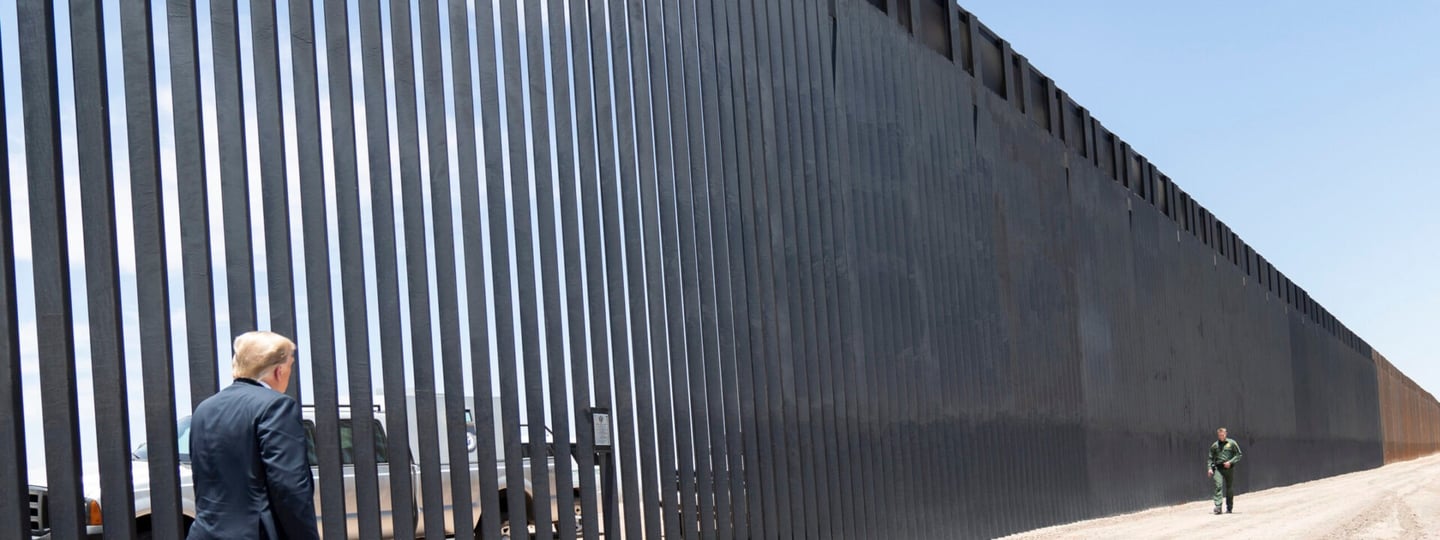

Where to purchase VOL. 2
Available on MERCADO LIBRE (for Argentina)
Available on AMAZON (rest of the world)


I don't rely on any help other than word of mouth. Recommend these books to a friend or influential person who might be interested.
Share this investigation, the largest ever conducted on Donald Trump.
"The future belongs to the patriots."
E-book version in ENGLISH LANGUAGE

